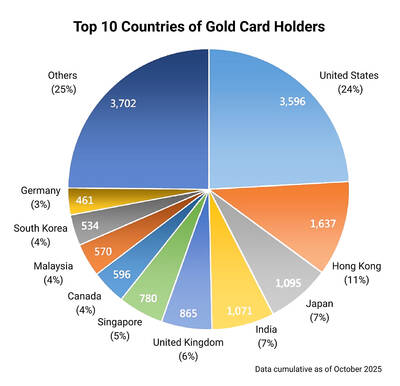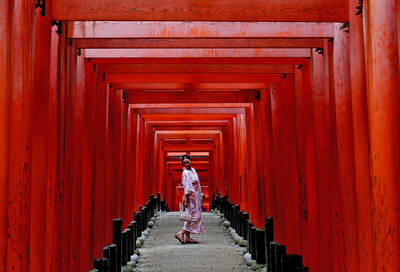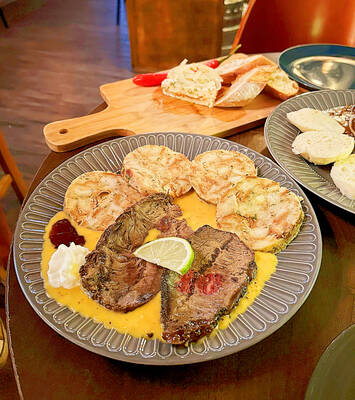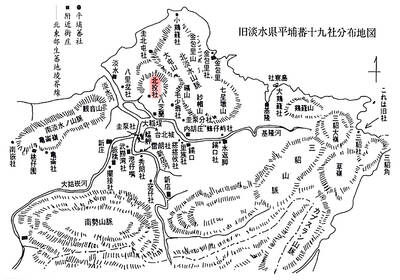“If disobedient, beat my kid to death,” (孩子不乖你打乎死) was, a decade or more ago when corporal punishment was an accepted part of school life in Taiwan, a common parental aphorism.
How times have changed. The development of the country’s education system forms the basis of Wei Jun-zhan’s (魏雋展) play Punish (罰), one of 10 solo performances by local artists beginning this weekend and lasting until Nov. 9, at Guling Street Theater.
“Today it’s more like, ‘touch my child and you’ll get sued,’” said River Lin (林人中), paraphrasing another of the play’s central conceits.
Lin, MOVE Theatre Group’s (動見体劇團) producer and the brains behind Fable To Be or Not To Be (漢字寓言:未來系青年觀點報告), challenged 10 performance artists to come up with a Chinese character that they think best symbolizes Taiwan.
“The idea came from online surveys that asked people to choose a particular [Chinese] character to describe a country for that year,” Lin said.
Citing one of last year’s surveys, Lin said respondents chose “rise” (漲) for China, “fake” (偽) for Japan and “disorder” (亂) for Taiwan.
The production sees choreographers, theater professionals, poets and multimedia artists coming together under one roof for solo performances — lasting roughly 20 minutes each — to convey their ideas about anything from entertainment to the economy.
Each performance features works by five of the artists. This weekends’ performers include actress Chou Heng-yin (周姮吟), whose work Struggle (掙) investigates gender bias in Taiwan. Huang Si-nong (黃思農) will play the erhu (二胡), a traditional Chinese fiddle, in her performance Forget (忘), a psychedelic rock number that looks at the popularity of talent shows such as One Million Stars (超級星光大道).
Chou Shu-yi’s (周書毅) Yield (讓) opens next week’s five performances. The choreographer combines mime with modern dance to examine how the meaning of the Chinese character has changed over time — from its Confucian roots meaning facing the world with humility, to its contemporary usage (often used by the bodyguards of politicians or celebrities pushing through a media scrum) meaning, “get out of the way.”
Lin chose “end” (末).
“As in the end of the world, or end of the Earth,” he said. When I pointed out that this was a rather pessimistic word to pick, he countered by referring back to the title of the performances.
“It’s the kind of thinking we hope to change through these performances. That’s why we called it Fable To Be or Not To Be … because its not the end of the world and it doesn’t have to be,” he said.

Seven hundred job applications. One interview. Marco Mascaro arrived in Taiwan last year with a PhD in engineering physics and years of experience at a European research center. He thought his Gold Card would guarantee him a foothold in Taiwan’s job market. “It’s marketed as if Taiwan really needs you,” the 33-year-old Italian says. “The reality is that companies here don’t really need us.” The Employment Gold Card was designed to fix Taiwan’s labor shortage by offering foreign professionals a combined resident visa and open work permit valid for three years. But for many, like Mascaro, the welcome mat ends at the door. A

The Western media once again enthusiastically forwarded Beijing’s talking points on Japanese Prime Minister Sanae Takaichi’s comment two weeks ago that an attack by the People’s Republic of China (PRC) on Taiwan was an existential threat to Japan and would trigger Japanese military intervention in defense of Taiwan. The predictable reach for clickbait meant that a string of teachable moments was lost, “like tears in the rain.” Again. The Economist led the way, assigning the blame to the victim. “Takaichi Sanae was bound to rile China sooner rather than later,” the magazine asserted. It then explained: “Japan’s new prime minister is

Divadlo feels like your warm neighborhood slice of home — even if you’ve only ever spent a few days in Prague, like myself. A projector is screening retro animations by Czech director Karel Zeman, the shelves are lined with books and vinyl, and the owner will sit with you to share stories over a glass of pear brandy. The food is also fantastic, not just a new cultural experience but filled with nostalgia, recipes from home and laden with soul-warming carbs, perfect as the weather turns chilly. A Prague native, Kaio Picha has been in Taipei for 13 years and

NOV. 24 to NOV. 30 It wasn’t famine, disaster or war that drove the people of Soansai to flee their homeland, but a blanket-stealing demon. At least that’s how Poan Yu-pie (潘有秘), a resident of the Indigenous settlement of Kipatauw in what is today Taipei’s Beitou District (北投), told it to Japanese anthropologist Kanori Ino in 1897. Unable to sleep out of fear, the villagers built a raft large enough to fit everyone and set sail. They drifted for days before arriving at what is now Shenao Port (深奧) on Taiwan’s north coast,